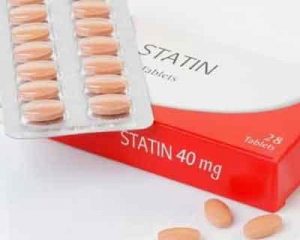- Home
- Editorial
- News
- Practice Guidelines
- Anesthesiology Guidelines
- Cancer Guidelines
- Cardiac Sciences Guidelines
- Critical Care Guidelines
- Dentistry Guidelines
- Dermatology Guidelines
- Diabetes and Endo Guidelines
- Diagnostics Guidelines
- ENT Guidelines
- Featured Practice Guidelines
- Gastroenterology Guidelines
- Geriatrics Guidelines
- Medicine Guidelines
- Nephrology Guidelines
- Neurosciences Guidelines
- Obs and Gynae Guidelines
- Ophthalmology Guidelines
- Orthopaedics Guidelines
- Paediatrics Guidelines
- Psychiatry Guidelines
- Pulmonology Guidelines
- Radiology Guidelines
- Surgery Guidelines
- Urology Guidelines
Statins effective in treatment of ovarian cancer: New Clinical Trial

A new study led by Keele University has shown how statins may be used as a potentially effective treatment against ovarian cancer.
Previous laboratory studies have largely been positive and shown statins to be active against cancer cells but, in contrast, when statins have been tested in real human patients with cancer, they have largely been ineffective. Published this week in Scientific Reports, the new research provides an explanation for this paradox and recommends the improved design for a new clinical trial.
Dr Alan Richardson, who led the research at Keele and co-authored the paper, explained, "We believe we have found the answer to the paradox: for statins to be effective as a cancer therapy, the right statin needs to be used, it needs to be delivered at the right dose and interval, and diet needs to be controlled to reduce sources of geranylgeraniol, which can limit the statin's effect on cancer cells."
The researchers at Keele University identified that a particular statin called pitavastatin is uniquely suited to target ovarian cancer cells because it combines a suitably long metabolic half-life (allowing it to continually inhibit tumour growth) with a structure which makes it a potent inhibitor of tumour growth in mice. However, it was also found that diet can limit the effectiveness of pitavastatin. Retrospective clinical studies of human patients taking statins to reduce cholesterol have also shown some reduced risk of dying of cancer.
Dr Richardson, whose work focuses on ovarian cancer, is the Therapeutics theme lead in the Institute of Science and Technology in Medicine and a Reader in Pharmacology in the School of Pharmacy at Keele University. He is also the author of the "Why do scientists do what scientists do?" website (http://whydoscientists.org/) which provides a lay explanation of how scientists design and interpret experiments. He explained, "Our research found that the tumour-inhibiting effects of pitavastatin in mice were limited when dietary geranylgeraniol was present. Statins work in cancer by preventing cancer cells making geranylgeraniol. However, geranylgeraniol is present in various foods including sunflower oil and some rice, so in future clinical trials, we need to carefully control diet to limit geranylgeraniol."
The next stage of research will be to conduct full clinical trials in humans -- something that Dr Richardson and his team are already planning.
Dr Richardson commented, "The key message of our work is that clinical trials of pitavastatin can now be properly designed, and we are in the very early stages of developing trials with our colleagues at Keele University and Birmingham University. It is also noteworthy that pitavastatin is available in a generic form, potentially making this a relatively inexpensive treatment."
To read full article click on the link given below.
Elizabeth de Wolf, Marwan Ibrahim Abdullah, Stefanie M. Jones, Karen Menezes, Darren M. Moss, Falko P. Drijfhout, Sarah R. Hart, Clare Hoskins, Euan A. Stronach, Alan Richardson. Dietary geranylgeraniol can limit the activity of pitavastatin as a potential treatment for drug-resistant ovarian cancer. Scientific Reports, 2017; 7 (1) DOI: 10.1038/s41598-017-05595-4

Disclaimer: This site is primarily intended for healthcare professionals. Any content/information on this website does not replace the advice of medical and/or health professionals and should not be construed as medical/diagnostic advice/endorsement or prescription. Use of this site is subject to our terms of use, privacy policy, advertisement policy. © 2020 Minerva Medical Treatment Pvt Ltd